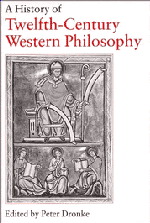Book contents
- Frontmatter
- Contents
- Preface
- Contributors
- List of abbreviations
- Introduction
- I Background
- II New Perspectives
- III Innovators
- IV The Entry of the ‘New’ Aristotle
- 15 Aristotelian thought in Salerno
- 16 David of Dinant and the beginnings of Aristotelianism in Paris
- Bio-bibliographies
- General Bibliography
- Index of Manuscripts
- General Index
15 - Aristotelian thought in Salerno
Published online by Cambridge University Press: 01 June 2011
- Frontmatter
- Contents
- Preface
- Contributors
- List of abbreviations
- Introduction
- I Background
- II New Perspectives
- III Innovators
- IV The Entry of the ‘New’ Aristotle
- 15 Aristotelian thought in Salerno
- 16 David of Dinant and the beginnings of Aristotelianism in Paris
- Bio-bibliographies
- General Bibliography
- Index of Manuscripts
- General Index
Summary
For the past sixty years or so, the name of Salerno has been associated with the history of medieval Aristotelianism. Although the role of the famous medical school is often mentioned in connection with the propagation of ‘the new Aristotle’, and more particularly with the treatises on natural philosophy, before their condemnation in Paris in 1210, the actual contribution of Salerno remains open to question. The chief difficulty lies in the fact that most of the source material is still unpublished, as regards both the Latin translations of Aristotle known in the twelfth century and the vast corpus of Salernitan writings. A major disadvantage ensues: the establishment of an accurate chronology has so far proved impossible; all one can do is to suggest approximations, which are often inadequate to shed light on the influence of one text on another. Researchers who tackle this question take up alternative attitudes: either waiting for the publication of critical editions before pronouncing themselves, or putting forward hypotheses – which become convictions in course of time – on the basis of a few easily accessible manuscripts. What seems most profitable in the present state of research is to blaze a trail by offering examples of explicit quotations or of the recognizable influence of Aristotelian thought. As a preliminary we shall examine the scientific motivation which may have led to the interest in Aristotle. The ground was largely prepared, in fact, by medical translations at the end of the eleventh century.
- Type
- Chapter
- Information
- A History of Twelfth-Century Western Philosophy , pp. 407 - 428Publisher: Cambridge University PressPrint publication year: 1988
- 13
- Cited by

